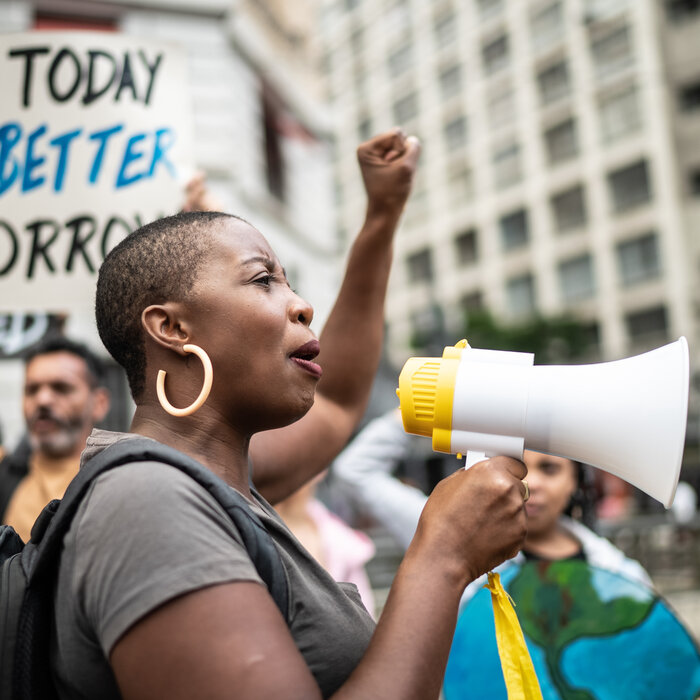In a Feb. 16 speech, Republican Sen. Mitch McConnell justified his opposition to the District of Columbia’s proposed overhaul of its antiquated criminal code by saying, “When the soft-on-crime local government has become too incompetent, when members of Congress can’t go about their daily lives without being attacked, when families cannot come to visit their own capitol in safety, then it is high time that the federal government provides some adult supervision.”
Less than a month later, he got his wish when the Senate voted to block the overhaul of the D.C. criminal code, making it the first time in over 30 years that Congress used its discretion to overturn local legislation. With concern about rising crime spiking across the country, Republicans and Democrats alike are scurrying to demonstrate their “tough” credentials. D.C. Mayor Muriel Bowser led the way and gave cover to other Democrats in Congress who otherwise faced a difficult choice: seemingly act against the District’s long-sought independence, or appear “soft on crime.”
In Bowser’s case, she vetoed the council’s passage of the overhauled criminal code, singling out both the expansion of the provision allowing long-incarcerated individuals the opportunity to demonstrate their rehabilitation to a judge and petition for release, and reduced maximum penalties for crimes such as carjacking, which currently could theoretically result in a 45-year sentence. (Many murder charges are not even punished so severely.) The council overrode it, but the mayor wasn’t done. You’d think she would acquiesce gracefully, since that’s the way democracy works. Instead, when the bill went to Congress, the mayor refused to support it. What better way to pave the path for President Biden and other moderate-to-conservative Democrats to demonstrate their so-called crime-fighting credentials?
We are conditioned in American society to immediately associate public safety with policing, prosecution and prison. It’s the muscle memory of our country.
Heather Warnken, executive director, Center for Criminal Justice Reform, University of Baltimore
Bowser’s action helped open the lid to Pandora’s box, with both houses voting to reject D.C.’s police-accountability legislation, which was fueled by the killing of George Floyd and would prevent the hiring of officers with misconduct records and expand public access to disciplinary records and body-camera footage, among other things. Biden will veto Congressional action this time, but we can expect the political impact—a warning to criminal-legal activists at both the District and federal levels—to be long-lasting.
Back to that ‘soft-on-crime’ rhetoric
House Oversight Committee Chairman James Comer has made the D.C. council his punching bag for drafting soft-on-crime legislation and praised Bowser for doubling down on her tough credentials by following up with her own bill – which would have toughened sentencing and gutted the Incarceration Reduction Amendment Act (IRAA) that has allowed so many of my friends to return home after incarceration for decades as juvenile offenders. (Fortunately, so many people objected that this particular proposal was dropped.)
I recognize that many people in D.C.’s hardest-hit neighborhoods – including Black residents – are feeling fearful and insecure as carjackings increase on their streets. And nothing I write should be taken as condoning that. However, I believe there is a larger, recurrent trend at work here as well.
In her seminal book, “The New Jim Crow: Mass Incarceration in the Age of Colorblindness,” Michelle Alexander argues that the fact that one-third of Black men in this country can expect to spend time in jail or prison can’t simply be explained as society defending itself against criminal predators. It’s also a reflection of organized White power defending itself against Black assertiveness. In Alexander’s view, Richard Nixon’s tough-on-crime agenda and Ronald Reagan’s escalation of the War on Drugs were aimed at halting the advances of the civil rights movement and perpetuating the neglect of the underclass. And that led directly to mass incarceration.
Thus, Black people’s protests are frequently seen not as organic demands for freedom, justice and equal rights, but as raw acts of lawlessness. In the 1960s, the government infiltrated our organizations and locked up our leaders to try to stop them. In the 80s, Ronald Regan used the scourge of the crack epidemic as a conduit for fearmongering, scare tactics and dog whistles to demonize and criminalize Black men. That led to children like myself being labeled “super predators” and Clinton’s 1994 crime bill (which Biden played a huge part in passing) — locking up entire Black communities and fueling today’s mass incarceration.
Today, these tough-on-crime policies and lawlessness rhetoric are again being used, both to gloss over the chronic disinvestment in Black neighborhoods and halt the advances in the entire left’s agenda. Think about it: After the horrific public slaughtering of George Floyd, it seemed as if this country had finally learned its lesson and was ready to actualize the values freedom, justice and equality it proclaims to represent. Confederate flags and statutes came tumbling down. Schools changed their names. Police accountability was demanded, and alternatives were sought. Even a group of progressive prosecutors sent a letter to President Biden calling for a more fair and equitable justice system.
And then the COVID pandemic helped fuel the usual, cyclic rise in homicides, and the far right did what it always does. It weaponized Black Lives Matters, the call to reimagine the role of police, the rise in progressive prosecutors and a movement to bring an examination of the role of race in America to schools. The D.C. government’s attempt to be a leader in humane criminal “justice” is now its epicenter.
And it’s a consequence that Democrats have allowed.
Even the Democrats are joining the party
Heather Warnken, executive director of the Center for Criminal Justice Reform at the University of Baltimore, told The Washington Post that, “We are conditioned in American society to immediately associate public safety with policing, prosecution and prison. It’s the muscle memory of our country.”
For example, I’ll bet that most of the Democrats in Congress who voted against the 300-plus-page revised criminal code never even read the complete bill or sought opposing opinions. It was simply about political optics.
One of the provisions in new bill would have allowed every person incarcerated under the D.C. code to petition the court for a sentence reduction after serving 20 years of imprisonment and demonstrating his or her rehabilitation. It could have freed a lot of people I’m now doing time with, and who show me daily that they are more than ready to return home as productive citizens and family members.
I fought for that bill. I wrote blog posts to help humanize us to the masses. I deliberated what rehabilitation looks like. I contributed to a documentary titled Redemption to highlight the work my returned-citizen friends are doing in the streets. I am helping the guys still in prison become civically engaged through More Than Our Crimes’ voting project.
And then, when word of the death of the revised code reached us, followed by Bowser’s attempt to gut IRAA, I watched the euphoria…the hope…the glimmer of life in the men’s eyes disappear…and be replaced by devastation and despair. All because of politics and fearmongering.
These are men who are rehabilitated. These are guys who are ready to be productive members of society, who have learned from their mistakes and are ready and willing to give back to their communities. These are men who are often on the front lines doing the violence interrupter work for which Bowser also claims credit.
The uptick in crime has nothing to do with individuals who have already paid their pound of flesh. The carjackings, gun crimes, etc. are being committed by a new wave of juveniles who recently returned citizens are now trying to influence.
Residents of this largely Judeo-Christian society must ask themselves, “Do I believe in redemption…or not?”




